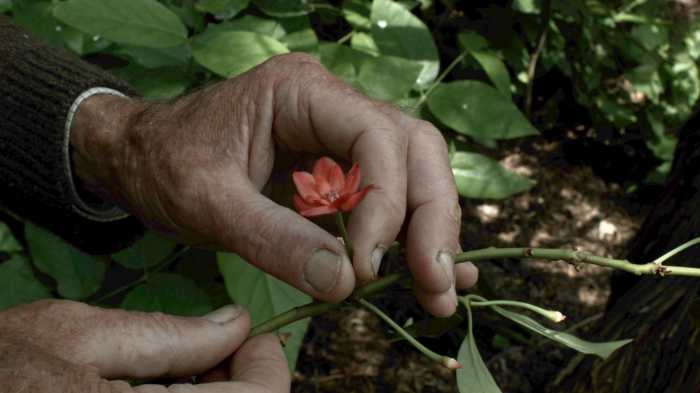“Sand Dollars” is a sensitive and authentic romantic drama, loosely adapted from Jean-Noël Pancrazi’s autobiographical novel that depicts the relationship between Anne (Geraldine Chaplin), a much older French woman, and Noeli (Yanet Mojica), a young Dominican woman. Noeli, who frequently asks Anne for money, often explains that the cash is for her brother, Yeremi (Ricard Ariel Toribio). Viewers, however, know that Yeremi is not Noeli’s sibling, but actually her boyfriend. Then Anne makes the decision to return to France with — or without — her beloved.
Chaplin is remarkable in the lead role. She is particularly expressive with her eyes and smile, as when Noeli asks to take Anne’s picture after delivering bad news.
In a recent Skype session, Laura Amelia Guzmán, who co-wrote and directed the film with her husband, Israel Cárdenas, spoke with Gay City News about the racial, class, and sexual politics of “Sand Dollars.”
Geraldine Chaplin superb as aging French woman in search of new life and love
GARY M. KRAMER: What are the attitudes toward people like Noeli who participate in these kinds of relationships in the Dominican Republic?
LAURA AMELIA GUZMÁN: Noeli is not gay, but she’s there for company. It’s another kind of prostitution. She has fixed clients — “friends” like Anne, who come every year. Pancrazi’s book was about him and a Dominican man in Samana — where we shot the film — who had a wife and two kids. This area of the country has developed in a very different way than other tourist points in the DR, which are more all-inclusive hotels. People who go to Samana — Europeans, North Americans, Russians — want to stay there and live there. They don’t judge anyone. Anne is 69 and Noeli was 20. You see that kind of gap between people in relationships here. In the countryside, where people don’t have education, they don’t get too moral. In the city, it’s another story.
GMK: What can you say about the practice of sex tourism in the DR? “Sand Dollars” uses the women’s relationship to reflect issues of colonialism, capitalism, and globalization in a country that disenfranchises women and the poor, especially.
LAG: When Anne goes out with her European friends, it is to a plantation house. You have that diversity of moneyed people. Anne rejects it. She doesn’t want to go back to that, it bores her. That’s what her life was like in Europe. She’s come to the DR to make herself anew and be in love again, to reinvent herself at 70 and feel desire and sexual attraction. Anne’s cross-migration is to find a place to belong and live better than she did in Europe. It’s paradise, but she’s very conscious that it’s not paradise. She’s aware of Noeli’s poverty. For our film, we changed [Pancrazi’s] story and decided to keep Anne in her space and not show where Noeli lives. Her village is miserable.
GMK: Can you talk about the casting and the way you developed the intimacy between the characters?
LAG: We decided when we were casting we wanted a foreigner to play Anne in the film. We didn’t care if the actor didn’t speak Spanish, because we do have that here: relationships that go on for ages, but the couple do not speak the same language. What can they say? What do they have in common? Anne knows she’s being lied to — she doesn’t care. She needs company. Money can’t buy love, but it can buy the illusion of love. We worked with close-ups to get the emotion in the characters’ eyes. That was something Geraldine and Yanet gave us. They were so comfortable in their skin. It was natural having them hang out. They never knew when we were shooting or not. We’d never said “action” or “cut.” Geraldine was very maternal to Yanet.
For Noeli, we wanted someone with wildness, that look that says, “I have no ambition.” Geraldine and the crew took a class in Bachata [Dominican music that originated in the shantytowns], and afterwards, went to a disco to show what everyone learned. It was embarrassing, so we sat down, and we saw this girl [Yanet] dancing, and we asked her to audition the next day. She made up this amazing story about a scar and driving a motorcycle that put me in a situation where I didn’t know what was true and what was a lie — just like the character in the film. Geraldine was happy we chose her.
GMK: Speaking of music, the song that opens the film could be describing the relationship between Anne and Noeli. I’m guessing that was deliberate?
LAG: What I like about the song is that it’s a sad song about despair and love, but you can dance to it. It’s happy in that respect. It tells a lot about how Dominicans are. They have a hard time economically and everything that comes along with that — child mortality and teen pregnancy — but everyone is happy all the time. It’s a way of surviving. Just like the characters do.
SAND DOLLARS | Directed by Israel Cárdenas and Laura Amelia Guzmán | Breaking Glass Pictures | English and Spanish with English subtitles | Opens Nov. 6 | Cinema Village, 22 E. 12th St. | cinemavillage.com



































